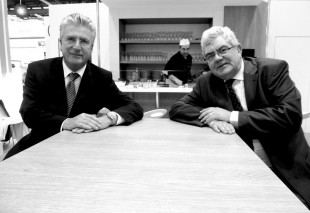

INTERVIEW: The aftermath of France's BSE scare

Before the BSE scare and subsequent import ban, France was importing over 2,000 tonnes of beef to Egypt alone. The ban has now been lifted and chairman for Interbev Dominique Langlois, and general director of the GEF Yves Berger, tell Caterer the sector’s offering is now bigger and better
In May this year a 12-year ban on the import of French beef to the Middle East was lifted. Enforced due to the BSE scare, or ‘Mad Cow Disease’ – a fatal neurodegenerative disease (encephalopathy) in cattle that causes a spongy degeneration in the brain and spinal cord, also transmittable to humans that eat infected carcass – the ban was detrimental to the French export industry.
Egypt alone which was receiving 2,000 tonnes of French beef prior to 1990 cut off all beef import ties with the country, as did the GCC.
“At the same time, Brazil was boosting export of its meat to these countries so it really was bad luck,” Dominique Langlois, chairman of Interbev, the body that manages French beef export in the EU, told Caterer at SIAL Paris 2012.
But the tables have turned. Efforts from the government and the GEF – which facilitates SMEs and meat suppliers in export trade outside of the European Union – have convinced GCC governments to give the country’s beef offering a second chance with the UAE and Kuwait already reopening pipelines.
The quality of the beef did all the convincing assures Langlois. But the journey to getting here has not been short of its challenges. The legislation and policies surrounding the beef’s safety has had to be watertight.
“There have been processes we have had to put in place to absolutely ensure the safety of the beef and convince people of this but the quality of the beef has seen the Middle East consumer market demanding this product. This has made our integration back into the market much easier,” says Langlois.
One of the biggest elements in ensuring safety is the testing process which takes place in France. All meat leaving the country is fully tested. In addition to this, the GEF ensures that any of the beef it is dealing with is fully traceable. “Every piece of muscle can be traced back to the farm it was produced at,” says Yves Berger, general director of the GEF.
Moreover, with these stringent procedures in place, France is the ideal supplier for the Middle East market – particularly where halal beef is concerned. Halal beef makes up 200,000 tonnes of the 1,300,000 tonnes of France’s current beef production.
“About 6% of French Muslims consume halal meat,” explains Langlois. “We ensure the use of certified halal abattoirs/slaughterhouses which have been specifically appointed by the mosques of Lyon and Avery.
Article continues on next page ...
Moreover, in December 2011, the French government put a law on SMEs that are performing halal slaughters which requires them to apply for a certificate approved by the government and mosques to ensure their techniques are proper.”
Presently, the demand has seen the GEF, a subsidiary of Interbev that focuses on exports outside of the EU – introduce meat brands including Elivia and Jean Roze into the market.
With news of the increased customs tax in Brazil, and a reduction in available grazing fields due to more plots being allocated for biofuel production, French beef firms saw this as the perfect time to seize the GCC market.
While GEF – which exhibited at SIAL Abu Dhabi and the Speciality Food Festival, both held last month, and will be present at Gulfood in February 2013 – is currently working to supply hotels and high-end restaurants with the French beef, there is a plan to roll the beef out at all consumer levels.
“The target is everyone – all consumers – restaurants and hotels. At present high end hotels in Dubai are being used as a point of entrance, for us to be able to introduce the beef to the region, but eventually the aim is to target all consumers and establish a presence at all levels including supermarkets.
We have a variety of different kinds of beef that can satisfy various demands. These will of course come with different prices so can satisfy a range of consumer tastes,” explains Berger.
Moreover, while Dubai is the current entry point and is quickly being followed by Kuwait, it won’t be long before the rest of the GCC market follows suit, and even the rest of the world.
“We are coming back to all the countries, for example Japan is opening up the export market for meat from France. When BSE started, all countries stopped accepting meat from France – it stayed within Europe.
We’re now seeing these countries respond and reopen the pipeline, as though this is a necessity. They want new countries to supply meat – not just Brazil and Argentina,” he says.
For now the GEF has prioritised breaking into Asian, the Middle Eastern and Russian markets.
“We’d love to be everywhere. By the end of 2013, we would love to – but it’s too early yet and it’s not so easy,” says Langlois. “For now we just want to prove we are serious in our aims to promote our beef. We’re not just going into the Middle East, doing a couple of shows and coming back.
“I’m so grateful countries like the UAE and Kuwait are giving us that chance again. They are believing in the product because the quality is one of the best,” Langlois concludes.